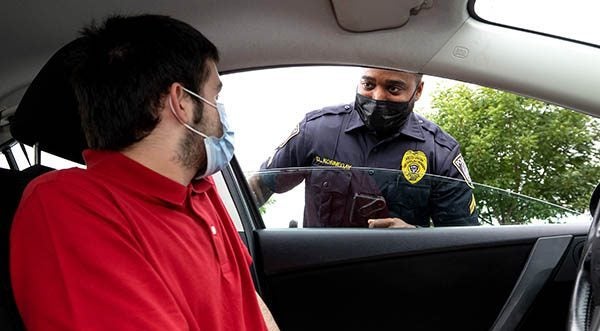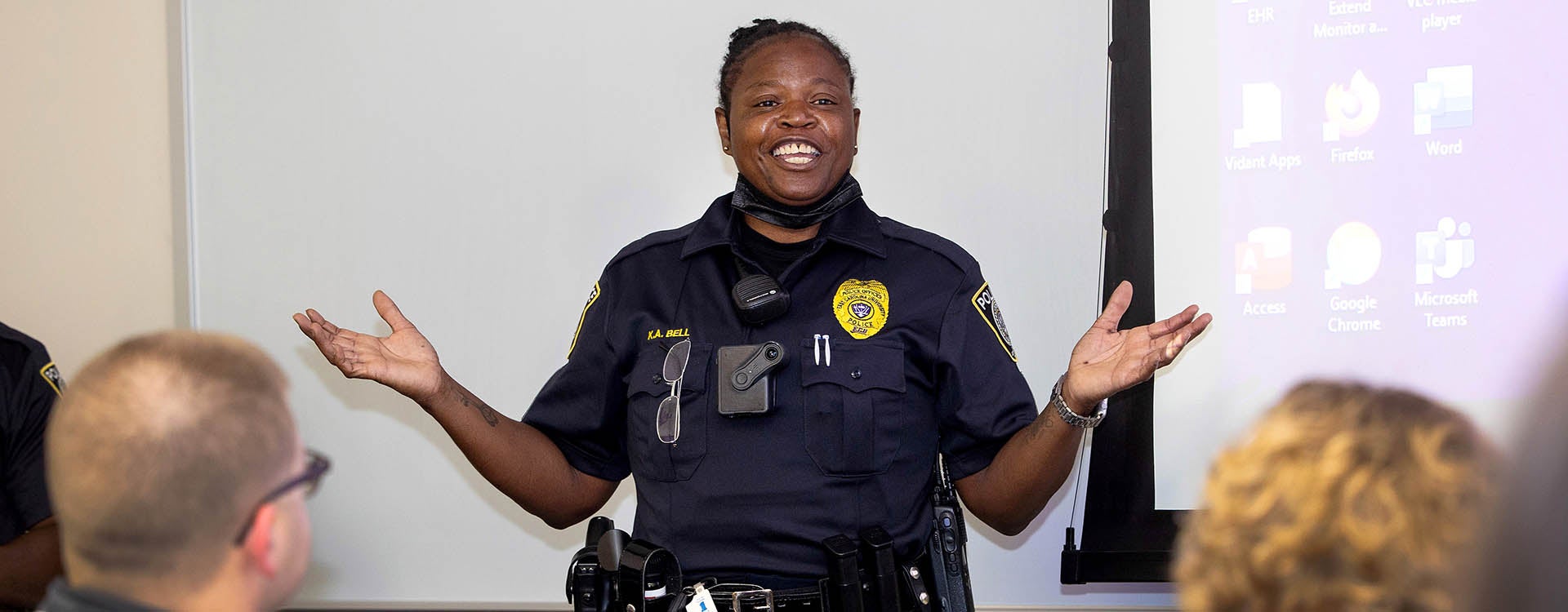ECU driving boot camp steers participants in right direction

ECU officer Travis Kornegay simulates a traffic stop with 21-year-old Landon Farmer during ECU’s driving boot camp. (Photos by Rhett Butler)
The sight of blue lights flashing in a rearview mirror can make your heart race — especially for inexperienced drivers.
Learning the do’s and don’ts of being pulled over has helped ease anxiety for East Carolina University driving boot camp participants who role-played a mock stop with ECU Police Department officers on Tuesday.
Nine young women and men in their teens and 20s — many of whom are on the autism spectrum and intend to get a driver’s license — spent the week learning the rules of the road in a simulated environment at ECU’s College of Allied Health Sciences.
The ECU Department of Occupational Therapy, whose faculty members and students have worked for many years with older drivers to maintain safe driving skills, started the boot camp in 2015 after discovering scarce research or support for driving instruction for young adults with special needs.
Getting a driver’s license is a rite of passage to adulthood, and occupational therapy professor Anne Dickerson — who taught her own son with high-level autism to drive — saw an opportunity to help others achieve greater independence and confidence.
The activity with ECU police officers is one most remembered by participants each year, Dickerson said.
ECU community affairs officers Kimberly Bell, Travis Kornegay and Isaiah Hill started with a five-minute Greenville Police Department video titled “What to Do If You’re Stopped by Police,” leaving plenty of time for questions and answers on traffic stop etiquette.
“What if I’m so nervous I can’t talk?” asked one boot camper. Officers assured the class that it can happen and it’s OK, and to try to be courteous and stay calm. “Follow the directions you’re given, and you’ll be fine,” Hill said.
IF YOU’RE STOPPED BY LAW ENFORCEMENT
• A traffic stop doesn’t always mean you did something wrong. An officer could be trying to help if, for instance, they see you accidentally left something on top of your car or have a tire going flat.
• Keep your hands on the steering wheel where the officer can see them.
• Follow the officer’s instructions.
• Don’t make sudden movements. Let the officer know if you need to open a purse or glove box to get identification.
• Tell the officer about any medical condition or disability to help improve communication.
• Remain calm and courteous.
After the in-class presentation, everyone walked to the parking lot where participants took turns getting inside a car. One by one, the officers pulled their patrol car behind each student driver for offenses such as speeding. The activity provided valuable, positive interaction with the officers.
“Everyone needs to be educated and informed on law enforcement no matter their situation,” Bell said. “We love the opportunity to communicate and work with them.”
Landon Farmer, 21, of Virginia, wants to get a driver’s license to be able to get to work on his own. He said the boot camp has taught him more about public transportation options and ride-booking services. He also learned about controlling behaviors that could make his driving less safe.
Before advancing to actual vehicles, participants spent time in an interactive driving simulator that taught them how to use the steering wheel and pedals simultaneously and recorded scenarios like a missed stop sign or complicated intersection to help avoid future mistakes. They also learned how to navigate their community, from using GPS and reading maps to riding an ECU Transit bus.
Beyond the mechanics of driving, an integral part of camp is spending time with others who often have trouble making friends or who may be ignored or bullied at school because of their differences. A graduation ceremony with family and friends took place Wednesday afternoon.
ECU occupational therapy graduate student Emily Mitchum said she and other ECU students have been impressed with the participants.
“They have great intuition about driving and the process of driving,” Mitchum said. “It’s been fun getting to know them.”
The camp also gave graduate students hands-on clinical experience, she said.

ECU officer Kimberly Bell answers questions from boot camp participants.
Related
https://news.ecu.edu/2020/10/27/driving-independence/
https://news.ecu.edu/2020/12/14/occupational-therapy-scholarships/